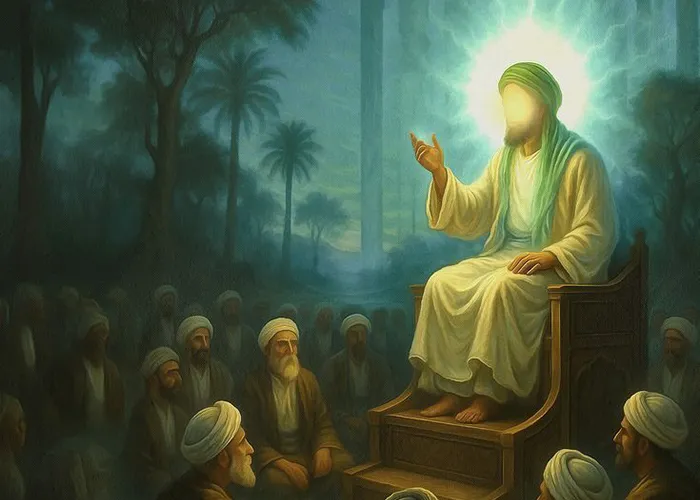Topic of the Week – Volume02 Issue37
The Prophet’s Mission; Steadfastness on the Path of Mercy for All Worlds
Seyed Hashem Moosavi
Introduction
We congratulate the entire Islamic Ummah and all of God’s servants throughout the world on the blessed birth of the Prophet of Mercy, Hadhrat Muhammad Mustafa (peace be upon him and his progeny). On the occasion of this week of his birth and this great Eid, which is a valuable opportunity to revisit the dimensions of his mission and the duties God placed upon him, we have sought to contemplate an aspect of his weighty mission and arduous task from the perspective of the Holy Quran.
In the esteemed exegesis (Tafsir) Majma’ al-Bayan, concerning the interpretation of verse 112 of Surah Hud, a narration is mentioned to this effect
أنّه حین لاحظ أصحاب النّبی آثار الشیب قبل أوانه على محیّاه (صلى الله علیه وآله) قالوا: یا رسول الله، تعجّل الشیب علیک. فقال (صلى الله علیه وآله) «شیبتنی سورة هود والواقعة؛[1]
“When the companions of the Prophet (peace be upon him and his progeny) observed the signs of premature grey hair on his countenance, they said, ‘O Messenger of God, grey hair has come upon you early.’ He (peace be upon him and his progeny) replied, ‘Surah Hud and Surah Al-Waqi’ah have aged me.'”
In other narrations, Surahs such as “Al-Mursalat,” “Al-Naba’,” “Al-Takwir,” and several others are also added to these two.[2]
Many commentators believe the Messenger of God said this because Surah Hud contains the verse
فاستقم كما امرت و من تاب معك[3]
“So remain steadfast as you have been commanded, [you] and those who have repented with you”.
Some commentators also narrate that a scholar saw the Prophet (peace be upon him and his progeny) in a dream and asked him: “What was the reason for your statement, ‘Surah Hud aged me’? Was it due to the accounts of previous nations and their destruction?” The Prophet (peace be upon him and his progeny) explained: “Its reason is the verse ‘«فاستقم کما أُمرت“[4]
Furthermore, it is narrated from Ibn Abbas in interpreting this noble hadith: “No verse was revealed to the Messenger of God (peace be upon him and his progeny) that was harder or more burdensome upon him than the verse فاستقم کما أُمرت و من تاب معک.”[5]
In any case, this chapter – besides that verse – contains other impactful verses related to the Resurrection and the reckoning in the court of Divine Justice, verses about the fate of past nations and the punishment they incurred and also verses instructing steadfastness against corruption. The collective nature of these verses carries the essence of “responsibility”… and under such circumstances, it is not surprising that one, upon contemplating these responsibilities, becomes aged and worn.
The Foundational Question
This Divine command to the Prophet (pbuh) and his followers poses a fundamental question for us: Steadfastness against what? And what was this central mission that required such arduous steadfastness?
The Central Mission: A Mercy to All Worlds
To understand the answer, we must see how God introduces His Prophet (pbuh) in the Holy Quran and what mission He entrusted to him. In other words, the key to the answer lies in precisely understanding the mission and identity of the Prophet (peace be upon him and his progeny) from the Quranic perspective. God Almighty, in numerous verses of the Holy Quran, has elaborated on this mission and recounted the identity and mission of the Prophet (peace be upon him and his progeny). Perhaps one of the most prominent, eloquent, and yet most difficult titles He has chosen for His Prophet (pbuh) is the title “«رَحْمَةً لِّلْعَالَمِینَ؛[6] “– “a mercy to all the worlds.” That is, the Prophet (pbuh) was tasked with being the embodiment of Divine mercy and compassion for all creation.
At first glance, this title seems beautiful, appealing, and an easy mission. However, in reality, it is one of the heaviest and most demanding responsibilities. Being a mercy to all worlds means feeling an unconditional responsibility towards all human beings, whether allies or opponents, friends or enemies. Someone who is a mercy for others cannot be indifferent to them. He is happy in their happiness and saddened by their suffering, even if they do not listen to him and stand against him. This is well depicted in verse 128 of Surah At-Tawbah:
لَقَدْ جَاءَكُمْ رَسُولٌ مِّنْ أَنفُسِكُمْ عَزِيزٌ عَلَيْهِ مَا عَنِتُّمْ حَرِيصٌ عَلَيْكُم؛
“There has certainly come to you a Messenger from among yourselves. Grievous to him is what you suffer; [he is] concerned over you [i.e., your guidance] …” Also, God Almighty addresses His beloved Prophet (pbuh) at the beginning of Surah Taha, acknowledging his immense compassion for guiding people and instructing him not to endanger his own well-being for the sake of others:
طه، مَا أَنزَلْنَا عَلَيْكَ الْقُرْآنَ لِتَشْقَىٰ إِلَّا تَذْكِرَةً لِّمَن يَخْشَىٰ؛ [7]
– “Ṭāhā. We have not sent down to you the Qur’an that you should be distressed. But only as a reminder for those who fear [God]…” Meaning, the Quran was not revealed to cause you hardship, but the Prophet’s boundless eagerness for people’s guidance caused him distress and grief.
Steadfastness on the Path of Mercy; A Difficult Test
This profound sense of responsibility placed the Prophet (peace be upon him and his progeny) in a difficult position. On one hand, he could not be indifferent to people’s misguidance and wretchedness, and on the other hand, he was obliged to guide them towards salvation with justice and wisdom. This guidance and universal mercy sometimes manifested as glad tidings and encouragement towards good deeds, and at other times as warnings and deterrence from evil deeds. It was precisely at this point that many, due to conflict with their transient worldly interests, did not accept this compassion, enjoining good and forbidding evil, considering it interference in their lives and standing against it, to the extent that they even resorted to persecution, harm, and plots to assassinate the Prophet (peace be upon him and his progeny). Yet, the Messenger of God (peace be upon him and his progeny) was commanded to remain well-wishing and compassionate even towards his enemies.
Steadfastness in such conditions is truly difficult. A steadfastness that must, while dealing firmly with enmity and disbelief, keep mercy and benevolence alive in the heart.
Tangible Examples of Compassionate Steadfastness
The history of the Prophet’s life (peace be upon him and his progeny) is replete with brilliant examples of this steadfastness on the path of mercy. During some battles and difficult moments when even his noble body was wounded due to enemy attacks, and he was asked to curse the enemy, he would say: “I was not sent to curse, but I was sent as a mercy to all the worlds.” At the time of the Conquest of Mecca, when the chieftains of the polytheists who had persecuted him and his companions for years were captured, the Prophet (peace be upon him and his progeny) granted them general amnesty and said: “Today is a day of mercy.”
Based on this, his wars against the polytheists, and their killing or capture, must also be interpreted within this same framework of Divine mercy. At the Battle of Badr, when a group of Quraysh leaders were taken captive, the Prophet (peace be upon him and his progeny) smiled as they passed by. They were surprised by this behaviour and thought the smile was out of joy for victory and to insult the captives. The Prophet (pbuh) immediately said: “My smile is because I must strive and labour to pull you towards Paradise.” He explained that the reason for his smile was not joy at their capture, but joy for their bright future and guidance towards Paradise; much like a compassionate mother who, for her child’s recovery, administers bitter medicine with a smiling face, while inwardly suffering from the child’s distress.
The Duty of the Ummah: Continuing the Path of Steadfastness and Mercy
This command for steadfastness is not exclusive to the Prophet (peace be upon him and his progeny). Due to the continuation of the verse which says: “ وَمَن تَابَ مَعَكَ؛ “and those who have repented with you,” this matter pertains to all who consider themselves followers of the Prophet (pbuh). They must behave like him to the extent of their closeness to him. The difficulty of the task lies precisely here, because the followers of the Prophet must emulate his example in both compassion and steadfastness.
Imam Khomeini (may God have mercy on him), explaining this topic with inspiration from his teacher, the late Shah Aabadi (may God have mercy on him), says: The command to be steadfast is mentioned in other chapters of the Quran as well, so why did the Prophet (peace be upon him and his progeny) say, “Surah Hud aged me”? The reason is that in this verse, an additional phrase is included: “ و من تاب معک“ – meaning, not only is the Prophet himself commanded to be steadfast, but his companions must also remain firm on this path. This very point shows that the Prophet is not only responsible for his own actions but also bears responsibility for his Ummah. Therefore, if an individual commits a wrong, and the Prophet has the ability to guide him but neglects to do so, he is considered a partner in that wrongdoing.
Today, our mission is also steadfastness based on “ رحمة للعالمین“ (mercy to all worlds). A steadfastness that must, while adhering to principles and values, be accompanied by wisdom, sound advice, good exhortation, and arguing in the best way (cf. An-Nahl, 16:125). A steadfastness that, in dealing with opponents, enemies, and even the ignorant, must not take on the colour of rebellion and undue harshness: “ وَلَا تَطْغَوْا“ (and do not transgress). A steadfastness in which compassion for guiding people must overcome anger and vindictiveness.
Final Word
The birth of the Great Prophet (peace be upon him and his progeny) is not merely a historical occasion. It is a reminder of a covenant that the Islamic Ummah has made with God to continue the path of steadfastness in mercy. This path is a difficult one; a path that aged the Prophet (peace be upon him and his progeny), but ultimate victory and Divine pleasure lie within it. It is incumbent upon us to remain steadfast on this path by emulating the Prophetic tradition and to convey his message of mercy and steadfastness to the world.
[1] . Wasa’il al-Shi’a, vol. 6, p. 172. Hadith 7659.
[2] . Tafsir Ruh al-Ma’ani, vol. 11, p. 179; and Wasa’il al-Shi’a, vol. 6, p. 172.
[3] . Surah Hud, verse 112.
[4] . Tafsir Ruh al-Ma’ani, vol. 11, p. 179.
[5] . Tafsir al-Mizan, vol. 11, p. 66.
[6] . Surah Al-Anbiya, verse 107.
[7] . Surah Taha, verses 1-3.
news via inbox
Subscribe to the newsletter.




